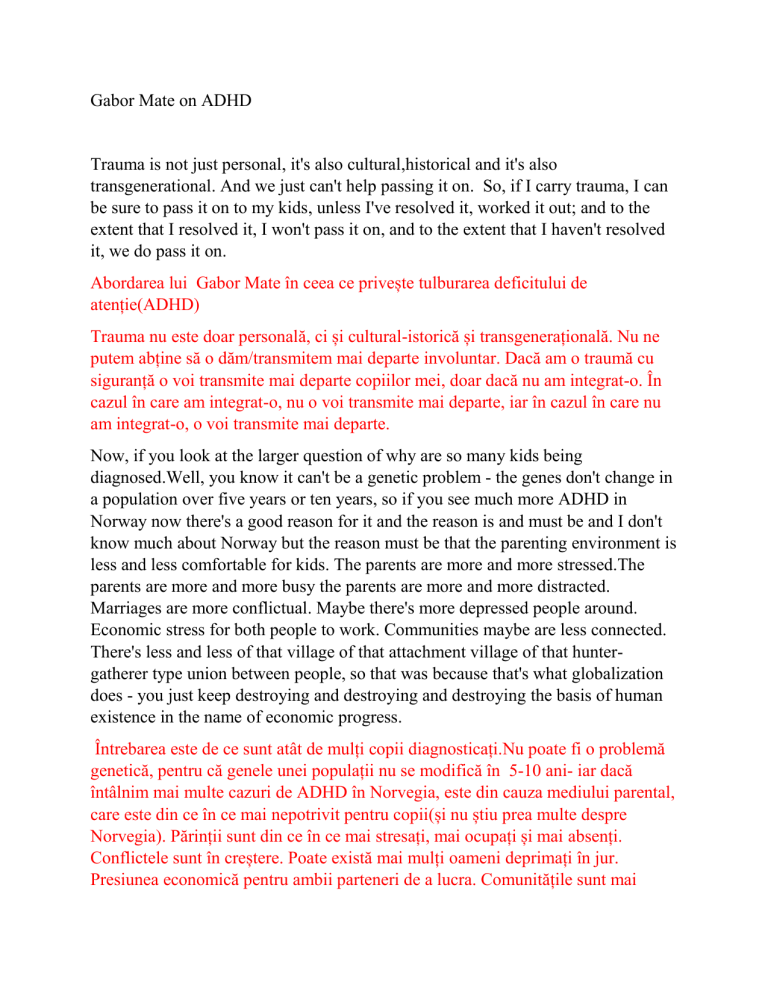
Gabor Mate on ADHD Trauma is not just personal, it's also cultural,historical and it's also transgenerational. And we just can't help passing it on. So, if I carry trauma, I can be sure to pass it on to my kids, unless I've resolved it, worked it out; and to the extent that I resolved it, I won't pass it on, and to the extent that I haven't resolved it, we do pass it on. Abordarea lui Gabor Mate în ceea ce privește tulburarea deficitului de atenție(ADHD) Trauma nu este doar personală, ci și cultural-istorică și transgenerațională. Nu ne putem abține să o dăm/transmitem mai departe involuntar. Dacă am o traumă cu siguranță o voi transmite mai departe copiilor mei, doar dacă nu am integrat-o. În cazul în care am integrat-o, nu o voi transmite mai departe, iar în cazul în care nu am integrat-o, o voi transmite mai departe. Now, if you look at the larger question of why are so many kids being diagnosed.Well, you know it can't be a genetic problem - the genes don't change in a population over five years or ten years, so if you see much more ADHD in Norway now there's a good reason for it and the reason is and must be and I don't know much about Norway but the reason must be that the parenting environment is less and less comfortable for kids. The parents are more and more stressed.The parents are more and more busy the parents are more and more distracted. Marriages are more conflictual. Maybe there's more depressed people around. Economic stress for both people to work. Communities maybe are less connected. There's less and less of that village of that attachment village of that huntergatherer type union between people, so that was because that's what globalization does - you just keep destroying and destroying and destroying the basis of human existence in the name of economic progress. Întrebarea este de ce sunt atât de mulți copii diagnosticați.Nu poate fi o problemă genetică, pentru că genele unei populații nu se modifică în 5-10 ani- iar dacă întâlnim mai multe cazuri de ADHD în Norvegia, este din cauza mediului parental, care este din ce în ce mai nepotrivit pentru copii(și nu știu prea multe despre Norvegia). Părinții sunt din ce în ce mai stresați, mai ocupați și mai absenți. Conflictele sunt în creștere. Poate există mai mulți oameni deprimați în jur. Presiunea economică pentru ambii parteneri de a lucra. Comunitățile sunt mai puțin conectate. Întâlnim din ce în ce mai puțin acea coeziune din satele de vânător-culegător , din cauza globalizării- tindem să tot distrugem bazele existenței umane în numele progresului economic. And so,the more parents are stressed I guess that more kids are gonna get diagnosed.And then we say the kids got a disease let's give him a pill rather than looking at well what is it about the environment because the good news is and I'll talk about that later again if I have a chance is that the brain can develop new circuits as I mentioned before. The question is what conditions are required for that. And if we really understood the implications of the science and the wisdom then a question would be asking ourselves: okay! if all these kids are developing problems, what conditions are causing that and what conditions do we have to create to lead them in a new direction to help them reconnect? Cu cât sunt mai stresați părinții, cred că va crește numărul cazurilor de copii diagnosticați. Apoi ne gândim că dacă are o boală copilul, trebuie să îi dăm pastile în loc să ne uităm mai bine la mediul din care provine, pentru că vestea bună este că, se pot dezvolta circuite noi în creier. Întrebarea este ce condiții sunt necesare pentru acestea. Dacă înțelegem întradevăr implicațiile științei și ale înțelepciunii, atunci ar trebui să ne întrebăm pe noi înșine: în regulă! Dacă toți copii aceștia dezvoltă problem, ce condiții le cauzează și ce condiții ar trebui să creăm pantry a-i îndruma într-o direcție în care s-ar putea reconecta?